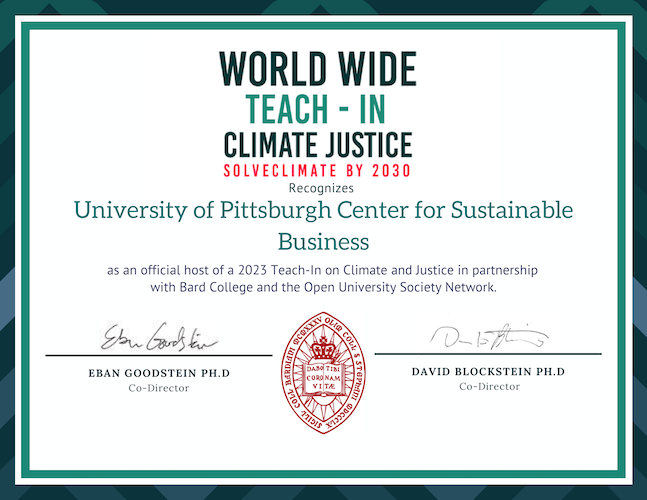
Table of Contents
- Featured Speakers
- Recommended Reading
- Agenda
- Compendium
- Travel & Accommodations
- Event Health & Safety
- Corporate Sponsors
Featured Speakers
- Professor Remi Trudel, Boston University
- Aiyana Bodi, Drawdown Labs
- Vanessa Miler-Fels, Schneider Electric
- And many others!
Recommended Reading
We recognize that many of you will not have sufficient time to read extensively in advance of the meeting. As such, we have carefully selected material to help you prepare for our discussions, keeping in mind the need to balance substantive contribution, readability, and technical expertise. The below documents are organized by publication date, starting with the most recent.
- Nudging Consumers to Purchase More Sustainably
- Get Your Science Out of Here: When Does Invoking Science in the Marketing of Consumer Products Backfire?
- Strengthening B2B brands by signalling environmental sustainability and managing customer relationships
- The Elusive Green Consumer - co-written by Workshop Facilitator, Professor Rishad Habib
Compendium of Papers and Courses
Purpose
There are still many, many things we do not know about how taking a more sustainable approach to business can lead to better financial, social, and environmental outcomes for a wider range of stakeholders. We aspire to make the Center for Sustainable Business a world-renowned hub for applied research in the field of sustainable business models.
The Center solicited submissions from around the globe to recognize the best sustainable business practices within any institute. This compendium will be shared with senior leaders attending our Spring Sustainable Business Forum and published via the Center.
Where we solicited from
- Green Schools List
- NBS SCC (Network for Business Sustainability- Sustainability Centres Community)
- SDSN (the UN Sustainable Development Solutions Network)
Criteria for inclusion
- Date range after January 2022
- Courses OR Research Papers / Working Papers
- Related to Sustainable Business
- Working Paper: “Managing uncertain inventories, washing, and transportation of reusable containers in food retailer supply chains”
-
Lam Family College of Business, San Francisco State University
Decarbonize Middle America WorkstreamThis article discusses the challenges faced by food retailers in managing the inventories, washing, and transportation of reusable containers in their supply chains. Using reusable containers can help reduce waste and improve environmental sustainability, but it also creates uncertainty in terms of inventory management and cleaning requirements. They propose a mathematical model to help food retailers manage their inventory of reusable containers, as well as the washing and transportation processes. The model considers various factors such as the demand for products, the number of reusable containers available, the cost of washing and transporting the containers, and the potential for loss or damage. Examples demonstrate the effectiveness of the proposed model in managing the uncertainty associated with the use of reusable containers. There is a potential cost savings by optimizing the inventory, washing, and transportation while improving operational efficiency, reducing waste, and achieving sustainability goals.
- Course: “Seminar Course on Sustainability and Strategic Audit”
-
University of Asia and The Pacific
ESG Rosetta Stone WorkstreamThis seminar course is delivered by sustainability professionals at the Center for Social Responsibility (CSR) at UA&P. It aims to equip fourth-year students pursuing a BS in Management or Accountancy with complementary knowledge to the technical and managerial competencies acquired through other classwork. Students study Sustainability as a Strategy, which includes the different tools of non-financial corporate reporting and emphasizes the importance of Sustainability and Strategic Audit in Corporate Governance. At the end of the course, students will be able to define and differentiate sustainability from CSR, understand its concept in the context of the corporation, determine the importance and implications of sustainability in Corporate Governance and its integration into business strategy, relate the impact of climate change on business, and understand the financial risks and opportunities that come with this impact.
- Course: “The Economics of Human Rights”
-
University of Pittsburgh
Workforce 100% WorkstreamThis seminar course explores the responsibility of private businesses to respect human rights globally using economic theory. It aims to improve students' expertise on a complex economic issue through reading, research, analysis, discussion, and improving their writing and presenting skills. Students also gain practical experience by creating a case study including researching a corporation, applying economic analysis to complex social and business issues, and engaging in constructive debate about those issues. The goal of the case study is to give students a deeper perspective on the complexity of business interaction with human rights by researching human rights policies and issues for one company and by working together to summarize and present the results of the class research.
- Course: "The UN SDGs and Corporate Purpose: Partnering to Deliver Shared Value in Africa"
-
Gordon Institute of Business Science, University of Pretoria
ESG Rosetta Stone WorkstreamThe course explores the shift from a shareholder model to a stakeholder model and the importance of creating sustainable businesses with strategies that make a profit and have a purpose. It covers embedding the SDGs into business strategy, executing strategies to address global challenges, and the role of partnerships in delivering shared value for multiple stakeholders, particularly in the African context. The course emphasizes the need for businesses to develop the art of partnership and work together towards
- Course: “EmpowHER: Career Development Program for Women in Sustainable Finance”
-
NYU Stern Center for Sustainable Business
Workforce 100% WorkstreamThe NYU Stern Center for Sustainable Business has launched a career development program for women in sustainable finance called EmpowHER. The program aims to help a diverse group of professionals build their financial expertise and networks, creating the foundation for gainful career opportunities in sustainable investing. The two-year leadership development initiative for MBA students includes intensive training on ESG issues, hands-on learning experiences, employer engagement, networking opportunities, and mentorships. The program is designed to address the demand for sustainability-related financial expertise to manage the growth of ESG investments, which currently account for 1 in every $4 invested in the US.
Event Details
- Travel & Accommodations
-
Travel Guide Purpose
The CSB presents the following guide to be a tool to help navigate our guests through our city. We hope by providing this tool we can simplify some of the steps in getting your travel plans sorted as efficiently as possible for an enjoyable stay in the beautiful city of Pittsburgh.
Hotels Nearby
-
Closest to Campus:
-
Within Walking Distance to the University of Pittsburgh:
-
Local Accommodations within Walking Distance:
Transportation
-
Trains & Buses: Amtrack Pittsburgh Station & Greyhound Pittsburgh Station
-
Each station has public transit connections to campus as well as rideshare (UBER/Lyft) options
-
Flights: Pittsburgh International Airport
-
28x Airport Flyer goes directly from the airport to campus
-
The Super shuttle and rideshare are options to campus too
-
On-Campus Parking: If driving to the city or driving in from one of the terminals above
-
If needed, the CSB Center Manger (see below) will provide on-campus parking passes
Sustainable Restaurants & Attractions
-
- Event Health & Safety
-
In order to facilitate an inclusive event for all attendees, we are asking that all attendees be fully vaccinated to attend in person activities. Boosters are also strongly recommended.
While we are looking forward to gathering as a community, we encourage you to participate in the way that is most accessible to you. We will be providing remote access to the event should you be feeling ill or test positive for COVID-19 prior to the SBF. Testing prior to attendance is not required but strongly encouraged.
University policy dictates that masks are required in all university buildings if community levels are high. If community levels are medium or low in Allegheny County, we strongly encourage masking for all SBF activities but it is not required. We will have masks and hand santitizer available for attendees. Masking is also encouraged for travel.
If you have any additional access requirements, please reach out to discuss accommodations.
Please check your emails for up to date information or contact Kristen P Ahern with any questions.
This event was recognized as a part of the World Wide Teach-In on Climate and Justice in partnership with Bard College and the Open University Society Network.

This event is made possible with support from our Corporate Sponsors


Wednesday, March 29th
|
11:30-12:00 |
Registration and Light Lunch |
|
12:00-12:30 |
Group Introductions, Opening Remarks |
|
12:30-1:30 |
Breakout: Baselining [530A & 530B] |
|
1:30-2:15 |
Academic Keynote: The Materiality of Sustainability in Consumer Decision-Making and Valuation |
|
2:15-2:30 |
Break |
|
2:30-3:30 |
Panel: The Voice of the Customer |
|
3:30-4:15 |
Breakout: B2Blank [530A & 530B] |
|
4:15-4:30 |
Break |
|
4:30-5:30 |
Panel: Customer Education and Storytelling Around Sustainable Choices |
|
6:00-9:00 |
Dinner Reception at The Porch |
Thursday, March 30th
|
8:30-9:00 |
Coffee, Pastries, and Your Burning Questions |
|
9:00-10:30 |
Facilitated Workshop: SHIFT Framework to Build a Customer Education Plan |
|
10:30-10:45 |
Break |
|
10:45-11:30 |
Industry Keynote |
|
11:30-12:00 |
Key Takeaways |
|
12:00-12:15 |
Survey and Feedback |
